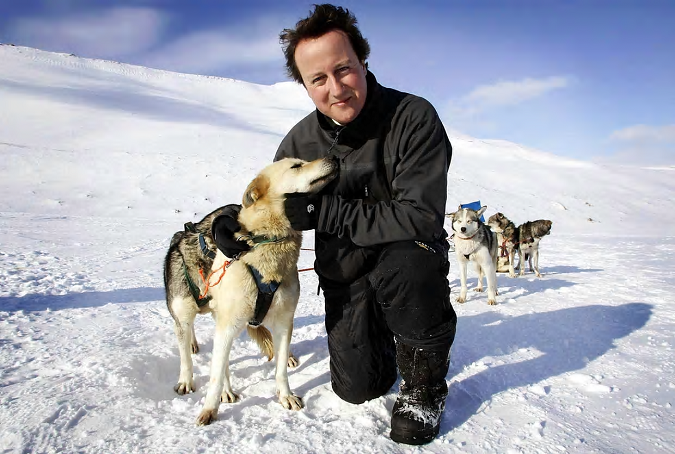Ten years after 'hug a husky', what is David Cameron's green legacy?

It is one of the most successful political reinventions ever. In just a few years as its new leader, David Cameron turned around the Tories’ toxic “nasty party” image - at least with enough voters to form a coalition government.
One of the most eye-catching moments came 10 years ago today with his “hug a husky” trip to the Arctic to highlight the impact of climate change. It was followed by Cameron’s commitment to lead the “greenest government ever”.
Yet with a succession of green policies now dropped or watered down, those environmental promises are now ringing hollow with many voters.
The green bank
Cameron rarely missed a chance in parliament or a UN stage to say that he launched the world’s first Green Investment Bank. Yet he is selling it just four years on — and there’s a big question mark over whether it will be required to make “green” investments.
Eclipsing solar
Cameron wasn’t exaggerating during PMQs recently when he said that 99% of the UK’s solar had been installed while he’s been prime minister, though he failed to mention the scheme that drove that boom was set up under Labour. In opposition, he was an enthusiastic backer of solar incentives, saying: “Imagine a Britain where each community is able to meet its own energy requirements instead of relying on a few huge power stations.” But his ministers recently cut solar incentives by 65%, with a corresponding crash in installations.
Burying plans for carbon storage
Once upon a time, Cameron said carbon capture and storage (CCS) was “absolutely critical” for cutting carbon emissions. Now he says it’s too expensive, and his government binned a £1bn competition to fund a trial CCS plant.
Backtracking on green homes
A few months after Cameron hugged a husky, plans were announced to make all new homes zero-carbon by 2016. After a decade in the making - during which time housebuilders were more or less resigned to having to meet the standards - Cameron’s government axed the plan. His ministers also scrapped the flagship energy efficiency scheme to bring down household bills, and still have nothing to replace it. The amount of insulation installed through government schemes is massively down since 2012.
Slapping a carbon tax on carbon-free energy
Last year Cameron’s government changed the rules to make renewable energy generators pay a carbon tax. The boss of Britain’s biggest coal power plant operator, Drax, which is converting to biomass and was hit by the change to the climate change levy, said it was like “putting an alcohol tax on apple juice”.
Retreat from wind while embracing fracking
Building new onshore windfarms is now pretty much uneconomical in the UK because of changes since the election last year. While subsidies were removed and planning made harder for turbines on land, tax breaks have been given to the shale gas industry and ministers’ letters revealed they are considering taking fracking planning decisions out of the hands of local authorities.
Air pollution
While Cameron has backed more progress against air pollution, his government has lobbied in Europe to undermine pollution caps for cars, to water down air pollution rules, and sought to block legislation that would force member states to carry out surprise checks on the emissions of cars.
Failing to lead on climate change internationally
While Barack Obama has played a huge role in bringing together countries to increase their climate change ambition in international negotiations, Cameron has been largely absent from the process. Though he showed his face at the Paris climate summit, and a UN summit hosted by Ban Ki-moon, he has never made a major intervention on the need for greater international action. He has decided to do without a climate change envoy, a role he himself created.
Change of rhetoric
On his Arctic trip a decade ago, the then leader of the opposition argued: “Climate change is one of the biggest threats facing the world and we must have a much greater sense of urgency about tackling it.” But halfway through his leadership of the coalition, the rhetoric had change markedly. The prime minister reportedly told aides to “get rid of all the green crap” on energy bills.
And there’s more…
Under Cameron’s leadership, exemptions have been ended for community energy; subsidies cut or ended for renewable heat at home; green cars no longer get favourable taxation; a climate change advice service has been dropped; a unit that advised on sustainable timber disbanded; plans for a new tidal power lagoon at Swansea appear to have been kicked into the long grass and a target to keep increasing the proportion of revenue from environmental taxes was dropped.
You can return to the main Market News page, or press the Back button on your browser.

